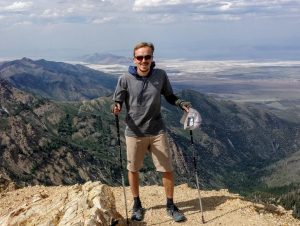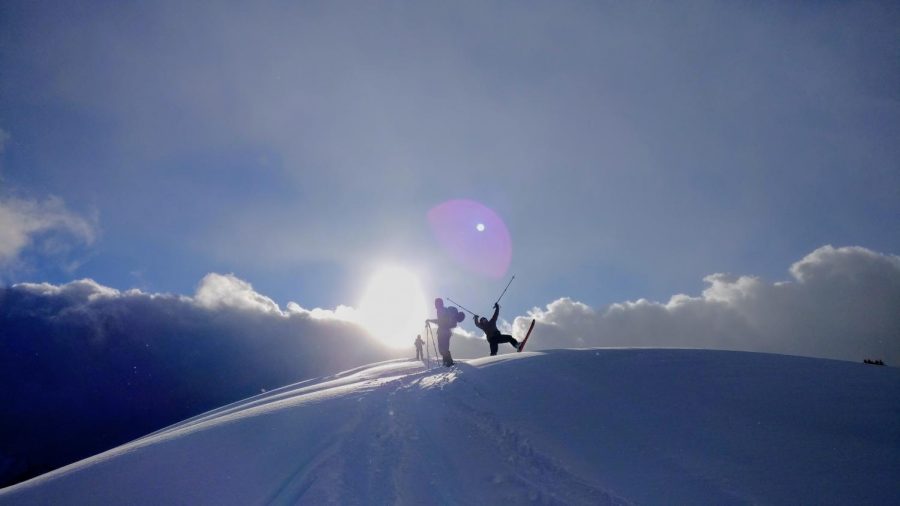Humans of the Wasatch Mountains
Nowadays, getting away from Salt Lake City doesn’t necessarily mean getting away from other humans. Trails, rivers and ski runs are full of people using up their free time to recreate. Although I am surrounded by other people in the outdoor community, I don’t often talk with others about why they spend so much time outside. I usually focus on planning and participating in the activity at hand without truly knowing why my companions and other people get out there. I assume most people are having fun like I am, but it has to go deeper than that. What exists below the surface level sentiments of “achievement,” “beauty” and “fun?” If pressed to be more specific, what would someone say? Why do people start going outside in the first place? What meaning does outdoor recreation bring to one’s life? In an attempt to find some answers, I interviewed six outdoor enthusiasts, three of whom are Wasatch staff members. I noticed themes between all the responses I received such as community, escape, challenge and perspective. Despite such overlaps, I noticed how unique each person’s experiences are. We have all been shaped differently by the natural landscapes we’ve spent time in and the outdoor communities we have been a part of. My hope is that in relating the thoughts and stories of these six people, you can begin to think about your own relationship with the outdoors. Under the name of each person, I have included a collection of quotes. These quotes stood out to me as particularly valuable, memorable or just fun. Enjoy!
Alexa Swanstrom
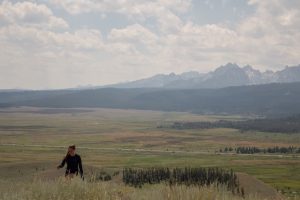
“I don’t know if you’ve ever had these camping trips where they’re low key miserable, but also just the most fun thing in the world?”
Waking up at a campsite near the Sawtooth Range:
“It was probably 40 degrees when we woke up, and my friend and I were huddled up in all of our warmest clothes. A storm had rolled through in the middle of the night, and when we woke up, there were these clouds rolling over the Sawtooths. I think we sat there for four hours and just watched them. I love being in a secluded area where it’s almost as if the world around you just completely stops, and you’re sitting there, and you have nowhere to be [and] nothing to do, and you get to sit there and enjoy your surroundings and the people that you’re with. That moment for me was amazing… doing absolutely nothing except having a conversation and watching the world literally move around us.”
On outdoor photography:
“One of my favorite things is when the mountains poke up through the clouds… so you can kind of see the bottom and the top, but you can’t see the middle.”
Inspiring others:
“My favorite thing is helping other people to get outside and instill a love for the outdoors.”
Jakob Thygerson
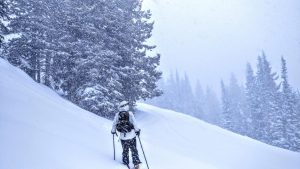
“We look forward to those big trips that are awesome and super memorable, but the things in the outdoors that I think are more defining and more influential in my life are the everyday things… If I had to choose one trail or place that’s had a huge impact on me, it’s probably the Bonneville Shoreline Trail because if I think of how many hours I’ve spent on it, it’s easily thousands of hours.”
How trail running helped Thygerson improve his mental and physical health post-LDS mission in Germany:
“Three days after I got back from my mission… I was just like, ‘You know what? I’m going to go for a run.’ … That first run was terrible. I made it probably 200 yards before I was totally winded, but for some reason, I did it again the next week and kept going out. And over that year, physically, I became totally different. I had lost 30 pounds, I was doing well in school, I was back into a good routine [and] had a job and better mental health.”
On reconnecting with his body, Earth and other people:
“Getting outside can be a way to disconnect from stuff, but I think it’s — more importantly — a way to reconnect to things that we lose sometimes.”
Julia Thomas
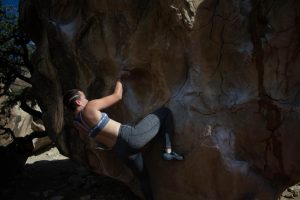
“Everyone’s first climbing trip has a special place in their heart; it showed me what nature is and how beautiful life is.”
Building confidence:
“Leading outside is kind of a big deal; it’s more terrifying than leading inside. I had led inside a ton [but] when you get out there and you have to look up, you’re like, ‘alright, the only time I’ve ever climbed something this high I’ve been on a rope that’s attached to the top, and if I fall [now], I fall a ways down.’ But the first time I did it, I kept my head, and I didn’t fall, and I felt confident the whole time. It gave me a lot more confidence than I thought I [could have] because I don’t think of myself as a very confident person. But doing something that scares you out of your mind helps you to realize that you can do hard things.”
A judgment-free zone:
“Outdoor rec. is my escape from everything else that I have to do because my [vocal performance] major is a lot of work. It’s expressive, but you don’t get a lot of relief from singing opera. But being outside and not having to worry about what other people are thinking about you is really nice, and it helps me to… be on my own [and] do my own thing, or be with my friends and just be able to breathe fresh air and not live up to expectations that you have put up for yourself… There’s not criticism outside; you can do whatever you want, and if you have the right community, everyone is going to support you in that.”
Ardyn Ford
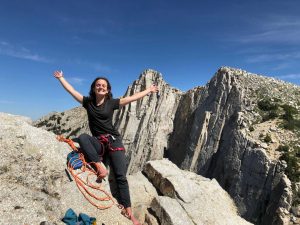
“In the past four years, I’ve been really lucky to go on lots of trips in every outdoor discipline, and those experiences are always very grounding. Especially when I’m feeling stressed, spending time outside helps me reflect and feel a sense of clarity.”
An unusual high school experience:
“When I was in high school, I had this really amazing chemistry teacher who also taught the AP environmental science class, and at the end of that class, she took us all on a five-day trip to southern Utah… After I took that class, she started taking some of my friends and I on canyoneering trips on random weekends for the next two years of high school. I didn’t really come to love outdoor recreation and camping until I was in high school and had this strong female role model who got me outside and showed me how challenging and also exciting outdoor recreation can be.”
Deconstructing goal-oriented recreation:
“When I started college, I really got into the objective-driven adventures and wanting to be strong and fast and to beat the boys at things. I think it’s cool that people are goal-oriented, but I also think that it can be toxic and not inclusive to focus on achieving objectives at all costs. It’s important to not feel like you have to always achieve something outside.”
Derrick Keating
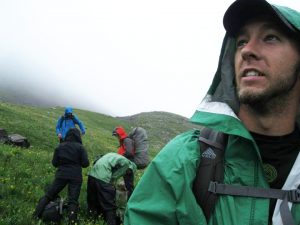
Nearly 10 years ago while at a soccer tournament in Colorado, Derrick and some of his teammates found a nearby climbing area called “Garden of the Gods.” Ignoring the warning signs at the crag which stated that a guide is required, they scrambled up a wall. When they paused at a ledge, they were suddenly yelled at by a rock climbing guide, so they quickly descended and left the scene. It turned out that climbing, not soccer, was the best part of the weekend and Derrick couldn’t stop thinking about the experience. “I realized that that person who was doing the guiding— [that was] their job. [I thought,] ‘I want to do that. I need to find out how I can pursue that kind of work!’ And that’s really what got the ball rolling for me. After that, I started researching schools that have outdoor rec programs.” Derrick went on to be a rock-climbing guide and is now pursuing a master’s degree in Parks, Recreation, and Tourism.
Whitewater wisdom:
“Every time I go on a river, I remember that just on the other side of the boat is death. We can’t stay underwater for several minutes and come out fine… and it’s just kind of this reminder that life is fragile and precious and a mistake or doing the wrong thing — that could be it.”
Having lived in four different states, Derrick has been a bit of a nomad since he began recreating outside:
“It’s really connected me to a lot of different people that I would have never met otherwise, and I find a lot of value in contrast and different communities. I learn some different values and learn more about how to be understanding of other people that I would not have learned if I didn’t leave where I grew up.”
Kiernan Dunn
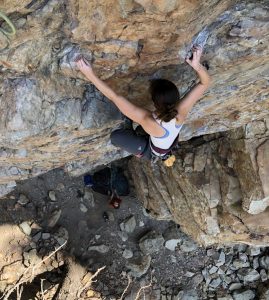
On presence:
“A big moment for me was when I got to college and went on a desert trip with a bunch of friends that I wasn’t super close with at the time but are now my best friends, and it was just that freedom and being able to disconnect from my phone and everything outside of just what was right in front of me. Those moments are the ones I try to replicate the most in my life because they made me be present and focus on what matters.”
On perspective:
“Being outside and immersing myself in the outdoors and getting away — it’s very humbling in a sense because it’s really good to see how truly small you are in comparison to everything around you [like] the big mountains or the vast desert. I would say that gives me perspective and a break from everything.”
Final Thoughts
I’m grateful for the interviewees’ efforts in opening up and engaging in honest reflection. If you feel inspired by their thoughts and stories, I encourage you to self-reflect. Can you relate to other people’s outdoor stories? How does your story differ from others? How do you derive meaning from your time spent outside? This year, be a little more vulnerable and tell others about how and why you connect with wild places.
